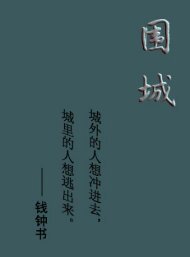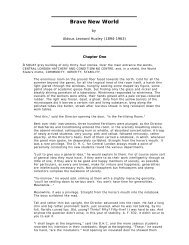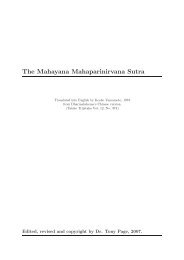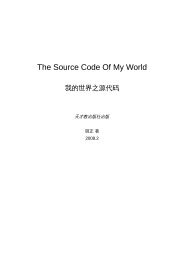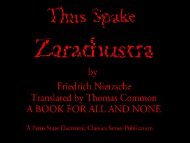Aphoristic Writings, Notebook, and Letters to a Friend, by Otto ...
Aphoristic Writings, Notebook, and Letters to a Friend, by Otto ...
Aphoristic Writings, Notebook, and Letters to a Friend, by Otto ...
Create successful ePaper yourself
Turn your PDF publications into a flip-book with our unique Google optimized e-Paper software.
Nostalgia is wishing <strong>to</strong> be a child (that is: viewing one’s own sins as a misfortune<br />
inflicted <strong>by</strong> others, which the criminal never does, who always feels himself guilty).<br />
Space is related <strong>to</strong> chaos; its essence is in the setting of distance (sickness <strong>and</strong><br />
aloneness are related), the three dimensions fly apart from each other, space has no<br />
unity, it is the collectivity of all externalised-ness of sensation, the entire I as the<br />
unconscious.<br />
Where unity of consciousness is absent, as with the criminal, solitude is absent<br />
(“The I senses its own self,” Rappaport), the sense of time is absent (because the<br />
various fragments of the ego, the unreal, nothing, are set as real, realised).<br />
*<br />
*<br />
*<br />
The saint (that is the inverse of the criminal, Christ, Augustine, Kant) suffers most<br />
heavily from the problem of time. The Greeks know no saints, which is why they<br />
know no problem of time.<br />
*<br />
Nature is immoral when man dissolves himself in<strong>to</strong> nature, becomes animal, plant,<br />
matter, nothing, just as it is thus unconscious. Nature is moral, ethical, aesthetic as<br />
soon as it is known, that is: held <strong>to</strong>gether. Then a sense for nature is possible.<br />
The criminal dies from inside (time), the sick person from outside (space).<br />
Epilepsy must also be connected with time.<br />
*<br />
*<br />
65



